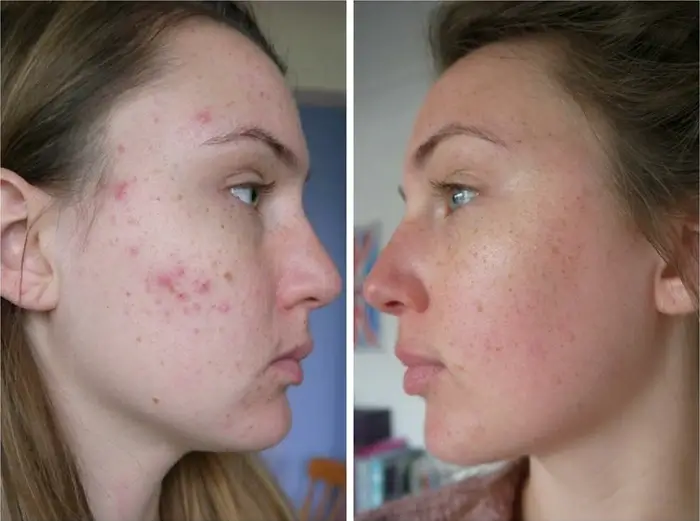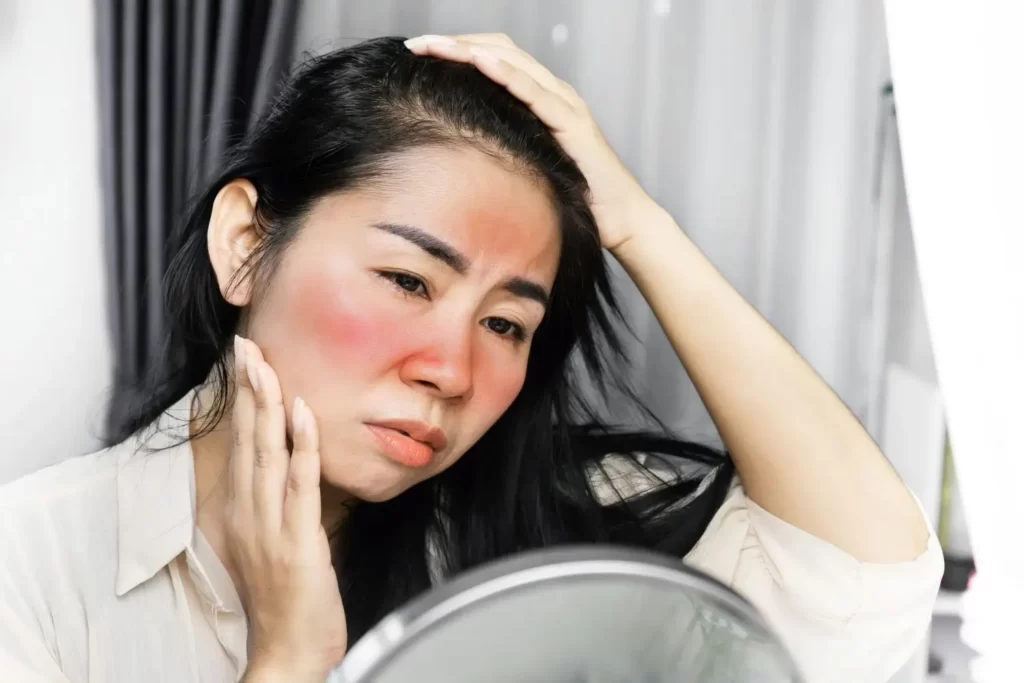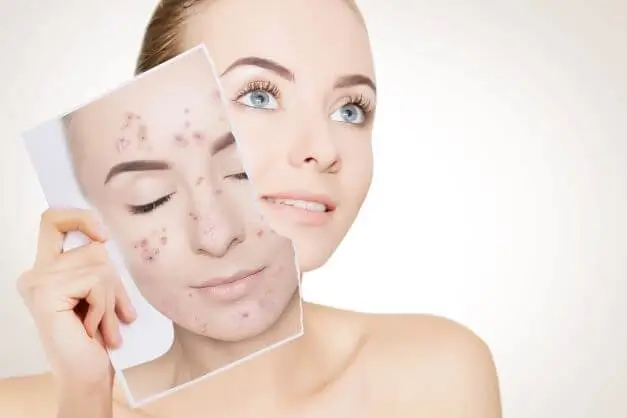When I was battling with severe acne problems, my dermatologist prescribed me a powerful drug called Accutane. It’s like the superhero of acne treatment, known in the science world as retinoic acid—a super ingredient that kicks blemishes and acne scarring to the curb.
But this hero has a strict rule: no buddies on the journey. That means, while you’re on Accutane medication, your skin becomes really vulnerable.
I learned the hard way that mixing certain skincare products or healthcare products while on this medication can invite trouble. And you know what’s also a no-go? Tattooing.
Getting a tattoo during this time is like throwing a party and not expecting any noise. The relationship between Accutane and any procedures that mess with your skin is pretty much impossible to maintain without risks.
Why? Because while on Accutane, your skin is like that one friend who gets sunburned way too easily.
It’s thin, sensitive, and doesn’t play well with effects that come after the needle does its dance.
I’ve seen friends who ignored this advice, and their journey to flaunt cool ink turned into a long-term project to manage unexpected skin reactions.
So, if you’re wondering, “can you get a tattoo on Accutane?” the answer is no.
While it might seem like a bummer, steering clear of the tattoo parlor while on Accutane is a smart move for anyone’s skin-story.
Trust me; it’s better to wait until the skin is ready to handle the adventure of getting inked.
Also Read: Elevate Your Ink Game: How To Remove Tattoo Stencil At Home Like A Pro!
What Accutane Does To The Body?
Accutane, a form of retinoic acid, is known for its superhero-like ability to tackle tough acne. Here’s how it works: by reducing the size of oil glands—those sebaceous glands under your skin that produce oil—it helps to prevent acne formation.
Fewer oils mean fewer clogged pores, and that means less bacteria growth. Plus, Accutane has some anti-inflammatory properties which further clean house, or in this case, your skin, by clearing out dead skin and debris. This is often referred to as the “purging effect”.
However, while it’s fighting the good fight against acne, Accutane makes your skin fragile, thin, and dry because it cuts down on oil production. If you’ve ever had a skin peeling after a sunburn, that’s a bit what it’s like—your skin might hold on to dryness and flaking.
This is key when it comes to tattoos. Because of decreased healing, a tattoo might not only hurt more but could heal poorly, leading to a distorted tattoo or even an infection.
So, if you’re thinking of getting some ink, it might be wise to wait until Accutane has left the building and your skin has bounced back to its tough self.

Accutane And Tattoo Relationship
Taking Accutane, that acne medication, has a big rule: while you’re on it, getting a tattoo is a no-go. Why? Let’s break it down. When you’re on this medication, doctors say it’s very important that certain things can’t be taken into consideration—like getting inked.
This medicine isn’t like popping an ibuprofen or Tylenol, which you strictly advised not taken 24 hours before because of their blood-thinning properties that make skin bleed more when you’re getting a tattoo.
And here’s another thing: Accutane is kind of like those Immunosuppressants that make it tough for your skin to heal after a scrape or cut. Taking these drugs can inhibit healing—and that’s also true for healing a tattoo.
So if you’re treating your spots with Accutane, remember that it has this special relationship with your body where tattoos and Accutane just can’t mix.
It’s like oil and water; they can’t hang out together. Think of Accutane as that strict parent who says you can’t have certain things while on this type of medication—and a tattoo is at the top of that list.
Also Read: Expert Insights: Why Tattoo Lines Thicker After Healing Demystified
1. Skin Flaking And Fragile Skin
When you take Accutane, your skin can get real sensitive and start to flake. It’s kind of like when a snake sheds its skin, except it’s your skin that’s constantly shedding. This makes it super fragile.
Now, imagine adding the trauma of tattooing to that. Not just a bad idea, it’s dangerous. The process of getting a tattoo can make the flaking worse, and when skin that’s supposed to be healing is busy peeling, that’s trouble.
The new ink might not stay put, and the picture can get all blurry, totally ruining the overall look. This fragility of your skin when combined with the powerful drug that’s fighting your acne is why doctors say hold up on the tattoos.
It’s not because they’re against cool art, but because that healing skin and the tattoo won’t mix well. You could end up with a mess instead of a masterpiece.
So, if you’re on Accutane and dreaming of your next piece of body art, it’s best to wait. Let your skin get strong again so it won’t be detrimental to the tattoo’s healing and you won’t risk a permanent oops on your skin canvas.
2. Dryness And Redness
Taking Accutane can turn your skin drier than it’s ever been, like all the oil that keeps it moisturized just up and left. It’s this stuff in the drug that prevents moisture loss but also makes getting a tattoo tricky.
See, when skin is constantly dry, it can start cracking, and that’s worse when there’s also redness, which forms because the skin is so sensitive from the drug. And if your skin is like a dry desert, it’s harder for the tattoo artist to work.
The ink doesn’t pack in or settle properly, leading to color that might leak or bleed out. Plus, if your skin is throwing a fit with breakouts, that means there’s higher chances of infections after you get inked.
Imagine trying to draw on a piece of paper that’s constantly moving—that’s what it’s like to tattoo super dry and irritated skin. So if you’re on Accutane and thinking about a tattoo, you might want to wait.
Let your skin calm down and get back to its usual chill self before letting that needle dance on you.
3. Decreased Healing
When you’re on Accutane, your skin doesn’t heal as fast as normal. It’s kind of like when you get a paper cut, and it just hangs around forever. This is super important to know, especially when you’re thinking about something big like a tattoo.
After you get a tattoo, there’s this healing aftercare stage that usually lasts about 4 weeks. It’s a crucial time for your skin to heal and for that cool new ink to look its best.
But if you’re on Accutane, your body’s like, “Hold up, I can’t heal even the smallest cuts quick,” which means there’s an increased infection rate and that’s not what you want for your new art.
That’s why a lot of tattoo artists are super careful and say, “Nope, we don’t work with clients on Accutane.” They know that even with the best care, the healing just isn’t the same, and they want your tattoo to look awesome, not get completely ruined because it can’t heal properly.
So if you’re taking this stuff for your skin, you gotta play it safe and wait. Give your skin the rest and time it needs to get back to its superhero healing powers before going for that tattoo.
4. Sunburn
When you’re on Accutane, your skin becomes super sensitive to sunlight. It’s like your skin’s natural SPF has taken a vacation.
The possibility of getting sunburn is high, and even a little exposure to sunlight can hurt like a bad sunburn.
Now, think about getting a tattoo. Tattooing on sunburnt skin is like adding fuel to the fire—it’s not just painful, it’s also generally forbidden.
Tattoo artists often reject clients who are on Accutane because they know the chance of pain is high.
So, it’s a good idea to wait for that period of time until you’re done with Accutane before you even think about getting a tattoo. Your skin will thank you, and so will the tattoo artist.
Also Read: Do Blue Ink Tattoos Hold Up Well Over Time: The Ultimate Guide

How Long After Accutane Can You Get A Tattoo?
When considering getting a tattoo, timing is crucial, especially if you’re on or have recently completed a course of Isotretinoin, commonly known as Accutane. As a medication known for its effectiveness in acne treatment, it’s in your best interest to refrain from any procedures that may irritate the skin.
Most dermatologists strongly advise to hold off on getting a new tattoo until at least 3 to 6 months after you’ve finished your Accutane treatment. But why wait, you may ask?
Accutane is a powerful retinoid medication that works to lessen the activity of sebaceous glands, thereby reducing excessive sebum production which contributes to acne.
Though it takes time to cure and clear the skin, its impact on the body doesn’t end with the last pill. The medication can continue to affect your skin’s ability to repair itself for some time.
From personal experience and the collective knowledge of skilled dermatologists, it’s understood that Accutane’s effects on the skin can be a worst nightmare for a fresh tattoo.
The process of inking is, after all, an art and a symbol of expressing your uniqueness — something that has become exceedingly popular in recent years. To ensure that your journey to expressing yourself through this art doesn’t turn into a story of regret, patience is key.
As someone who has experienced the ups and downs of skin treatments, I’d suggest not only meeting the minimum waiting period but considering extending the wait up to a year to ensure you have healthy skin that’s ready for ink.
That extra time could make all the difference in achieving a tattoo that’s safe and beautiful, a true testament to your individuality without the shadow of Accutane’s side effects.
Can You Take Accutane After Getting A Tattoo?
Starting Accutane after getting a tattoo is a decision that requires understanding the healing dynamics of both the skin and the effects of the drug. Accutane, a powerful drug used in acne treatment, can affect how your skin repairs itself.
When you get a tattoo, the needle penetrates not just the upper layers of the skin but the deeper layer as well. It’s important for this area to fully heal before introducing Accutane into your system.
Experts often warn that the drug hinders the healing process; thus, it’s generally advised to wait about 4 to 6 months after getting a tattoo before starting on Accutane.
This waiting period ensures that your skin has healed from the inside out, especially since the first month after inking is critical for surface healing.
Taking Accutane before this period can interfere with this process and potentially compromise the appearance of your new tattoo.
Also Read: How Long After A Tattoo Can I Have Surgery? Understanding The Essential Wait Period
Why Should You Wait To Get A Tattoo After Accutane?
Accutane is well-known for its capacity to reduce excessive oil production by shrinking the sebaceous glands, which can make the skin dry out and become overly sensitive. This state of increased sensitivity is why those who have been on Accutane should postpone any plans for a tattoo.
The needles used to ink the skin can further damage the overly thin and delicate epidermis—the upper layer of skin that becomes particularly fragile during and after treatment.
A tattoo artist needs a certain amount of skin thickness to properly set the needle; if the skin is too thin, the needle can penetrate too deep, making the tattoo process not only more painful but also potentially more damaging to the skin.
Moreover, when your skin’s protective layer is compromised, getting a tattoo could lead to a tattoo that doesn’t look good and has issues during the healing process. In worst-case scenarios, the vulnerability of your skin could even raise the risks of complications like blood poisoning.
So, although it may be challenging to wait, allowing your skin to recover fully from Accutane before getting tattooed is essential to ensure that your new artwork will both look good and heal properly without unnecessary pain or risks.

Side Effects Of Getting A Tattoo Right After Accutane
Getting a tattoo immediately after finishing Accutane can be dangerous and more painful than usual due to the heightened sensitivity and fragility of your skin.
The side effects of such an action can compromise both the healing and the appearance of your new ink, potentially leading to exacerbated skin trauma or infection.
This heightened risk is why experts urge the importance of allowing ample time for the skin to recuperate post-Accutane before undertaking any tattooing procedures.
Also Read: Can I Use Aspercreme With Lidocaine Before A Tattoo? Your Must-Know Guide
1. Blood Poisoning
One of the severe risks of getting a tattoo immediately after an Accutane course is blood poisoning, a serious condition that can make a person critically ill or even die.
Accutane makes the skin thin and fragile, and when a tattoo needle goes deeper into such vulnerable skin, there’s a risk that ink can mix with the blood.
This alarming main side effect could potentially introduce harmful bacteria into the bloodstream, indicating why utmost caution is required in such procedures.
2. Poor Tattoo Outcome
Getting inked right after an Accutane treatment can lead to a poor tattoo outcome, as the skin cells may be too damaged or broken to hold the ink properly.
This could result in a tattoo that looks even, patchy, or partially-disappearing—a disheartening mess that may need to be redone after only a few months. It’s vital to give your skin time to heal to avoid such disappointing results.
3. Painful Healing Process
Choosing to get a tattoo while on Accutane or shortly after can make the healing process extremely painful. Since the medication is known for thinning and destroying certain layers of skin, those already damaged areas endure more trauma from the needle, increasing discomfort.
It might take years for such skin to heal properly, and there’s no guarantee the ink will stay in place without the need for touch-ups, turning what should be a celebration of art into a prolonged ordeal of pain.
Does Accutane Fade Tattoos?
When pondering does Accutane fade tattoos, it’s important to understand the change in the skin’s ability to heal when on this medication. Although getting a tattoo while on Accutane isn’t recommended, what about old, healed tattoos?
There seems to be nothing to affect these healed works of art directly. Accutane works on the skin by affecting the cells within the dermis, the part of your skin responsible for producing new cells.
Some research speculates that Accutane causes certain cells to undergo cell suicide, a process that is relevant to how your skin heals and holds a tattoo.
The idea is that as skin is constantly growing outwards, cells below the surface are destroyed and cleaned up by the immune system. This breakdown and renewal act might affect how a tattoo heals.
Normally, the immune system clears away the broken down cells without impacting the ink held in the dermis.
However, UV radiation also breaks down the structure of ink particles over time, and these are then eaten by phagocytes, part of your immune system’s cleaner-uppers (that’s not a technical term, by the way).
Similarly, melanocytes, which produce melanin in response to UV rays, could stimulate a process where the skin turns darker, obscuring the tattoo, making the ink appear less saturated.
Understanding these intricacies suggests ways that sun exposure, which you are more susceptible to during Accutane treatment, can affect your tattoo.
To keep your body art looking its best, keeping it covered, using high SPF sunscreen, and avoiding prolonged sun exposure are key.
Over time, considering touching up your ink is wise, as even the best tattoos might fade—and that’s something Accutane might accelerate.
Remember, while a tattoo might never see the light of day, it’s part of your story—so keeping it vivid is worth the effort.
Also Read: The Enigma Solved: When Can I Use Scented Lotion On My Tattoo?
FAQs About Can You Get A Tattoo On Accutane
1. What Other Medication Can You Not Be On When You Want To Get A Tattoo?
Before getting inked, consult with your doctor and speak to the tattoo artist for a better understanding of risks. Blood-thinning medications, immunosuppressants, and antibiotics should be avoided to ensure a safe tattoo experience.
2. Should You Tell Your Tattoo Artist If You Are On Accutane?
Absolutely, tell your tattoo artist if you’re on Accutane; it’s crucial for your safety. Let them know as tattoos may not heal properly and there’s an increased risk of infections.
3. Do Tattoos Make Acne Worse?
Tattoos can exacerbate acne by causing skin irritation and inflammation, leading to more frequent breakouts on skin that’s got existing issues.
4. Is It OK To Tattoo Over Acne Scars?
It’s safe to tattoo over acne scars if they’re healed completely; always talk with your tattoo artist about the types of scarring to ensure the best approach.
5. Does Accutane Cause Your Skin To Thin?
A common misconception is that Accutane thins the skin; it makes it more fragile and sensitive to touch, but it won’t significantly reduce skin thickness.
6. Can I Get A Tattoo Before Accutane?
Getting a tattoo before starting Accutane treatment is possible, but it’s crucial to allow the skin to heal completely—typically a wait of at least six months is advised.
7. How Soon After Accutane Can I Get A Piercing?
After getting off Accutane, it’s best to wait around six to nine months before getting a piercing to ensure your skin has time to heal properly.
8. Can Tattoos Cause Acne?
Tattoos can cause skin irritations or rashes that resemble acne, especially if you have sensitive skin that’s prone to reactions. The puncture holes from tattooing may also harbor bacterial infections if not cared for properly.
Also Read: Tegaderm Vs Saniderm: Fortify Your Ink With The Ultimate Defense
Conclusion
While on medications such as Accutane, it is crucial to consider the delicate nature of your skin before getting a tattoo.
Can you get a tattoo on Accutane? Accutane can render the skin more fragile, potentially hindering the healing process of a tattoo and leading to a permanent mark that is far from the intended outcome, essentially ruining the artwork.
Experts often recommend a long wait time, suggesting that patients should allow up to 1 year after starting or going off the medication.
This caution ensures that the deeper skin layers have sufficiently recovered to heal properly, safeguarding both your skin’s health and the quality of the tattoo.
